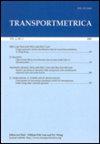Evaluation of discrete choice and neural network approaches for modelling driver compliance with traffic information
引用次数: 16
Abstract
This article evaluates dynamic driver behaviour models that can be used, in the context of intelligent transport systems (ITS), to predict drivers’ compliance with traffic information. The inputs to this type of models comprise drivers’ individual socio-economic characteristics and other variables that may influence their compliance behaviour. The output is a binary integer representing whether drivers comply with travel advice or not. Two approaches are available for formulating this category of classification problems: discrete choice models and artificial neural networks (ANNs). The literature on this topic clearly points to the limitations of the discrete choice approach which suffers from assumptions of perfect information about travel conditions, infinite information processing capabilities of drivers and inability to model the uncertainty in driver decision making or the vagueness in information received from ITS devices. ANNs, on the other hand, are able to deal with complex non-linear relationships, are fault tolerant in producing acceptable results under imperfect inputs and are suitable for modelling reactive behaviour which is often described using rules, linking a perceived situation with appropriate action. This study aims to evaluate the performance of these two categories of models based on a common data set of driver behaviour, collected from a field behavioural survey on a congested commuting corridor in Brisbane, Australia. This article proposes the combination of fuzzy logic and neural networks as a viable approach for overcoming the limitations of existing algorithms by modelling drivers as heterogeneous individuals. The results showed superior performance for a neuro-fuzzy model over binary choice models in terms of classifying or predicting the categories of drivers most likely to comply (or not comply) with traffic advice. The accuracy of the proposed model, in terms of classification rate, ranged between 95 and 97% compared to 50–73% for the discrete choice models.基于交通信息的驾驶员依从性建模的离散选择评估和神经网络方法
本文评估了可用于智能交通系统(ITS)背景下的动态驾驶员行为模型,以预测驾驶员对交通信息的依从性。这类模型的输入包括驾驶员的个人社会经济特征和可能影响其遵守行为的其他变量。输出是一个二进制整数,表示驾驶员是否遵守旅行建议。有两种方法可用于表述这类分类问题:离散选择模型和人工神经网络(ann)。关于该主题的文献清楚地指出了离散选择方法的局限性,该方法受到关于旅行条件的完美信息的假设,驾驶员的无限信息处理能力以及无法模拟驾驶员决策中的不确定性或从ITS设备接收的信息的模糊性的影响。另一方面,人工神经网络能够处理复杂的非线性关系,在不完美的输入下产生可接受的结果时具有容错性,并且适合模拟通常使用规则描述的反应性行为,将感知到的情况与适当的行动联系起来。本研究旨在基于驾驶员行为的通用数据集来评估这两类模型的性能,该数据集收集自澳大利亚布里斯班拥挤的通勤走廊的现场行为调查。本文提出模糊逻辑和神经网络的结合,作为一种可行的方法来克服现有算法的局限性,通过将驱动程序建模为异质个体。结果表明,在分类或预测最有可能遵守(或不遵守)交通建议的司机类别方面,神经模糊模型比二元选择模型表现更好。就分类率而言,与离散选择模型的50-73%相比,所提出模型的准确率在95 - 97%之间。
本文章由计算机程序翻译,如有差异,请以英文原文为准。
求助全文
约1分钟内获得全文
求助全文

 求助内容:
求助内容: 应助结果提醒方式:
应助结果提醒方式:


